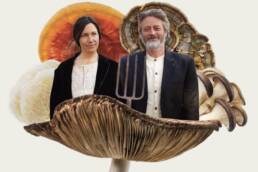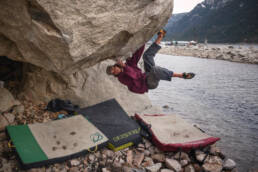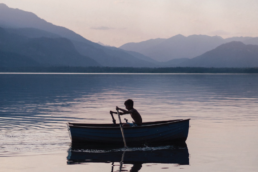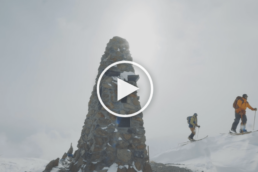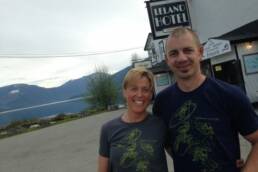The Kootenai Fungi business in Kimberley, British Columbia, may have an unorthodox farming style, but its crops are the shiitake. By Jeff Pew.
“No one would believe our approach actually works; it’s just so dirtbag,” says Monte Paynter, who is standing at his kitchen table holding a tiny petri dish and a glass jar of birdseed. He’s surrounded by kids’ toys and shelves lined with clear plastic bags stuffed with sawdust where mycelium — the brie-like genesis of exotic types of mushrooms like reishi, turkey tail, lion’s mane, oyster, and more — is propagating. “This is how it all starts,” he says. “We add a wedge of culture into the birdseed and wait for it to colonize, then mix it into bags of sterilized sawdust.” Paynter walks out the back door and lifts a Hello Kitty bed sheet nailed to the wall. He points to twenty bags of cultivating mycelium sitting on shelves. “Once it warms up,” he says, “we’ll hang them outside to fruit.”
Paynter, 48, is describing the workflow of Kootenai Fungi, the exotic mushroom company he operates in Kimberley, British Columbia, with his wife, Lija Lasmanis, 42. Lasmanis describes how they got into the business seven years ago after watching a TED talk about how mushrooms can save the world. They purchased a pricey starter kit, but after some mediocre results they decided to grow their own way. This summer, they expect to supply local restaurants and farmers’ markets with up to 27 kilograms a week of fresh and dried fungi.
Farming mushrooms seems like an odd profession for two hardcore athletes. Paynter, who’s also a carpenter and equipment operator, is a five-time Canadian National Telemark Champion. In 2003, he beat 47 spandex-clad international competitors, winning the event in his Wrangler jeans. Lasmanis, a physio assistant and extreme whitewater kayaker, has dropped the 40-foot Leap of Faith Falls on the Elk River. But these days, the couple is content spending more time nurturing their six-year-old daughter, Elah, and a whole lot of shiitake.
Jeff Pew
Jeff Pew is co-founder of Poetry on the Rocks, an annual celebration of spoken word in the East Kootenays. He works as a creative writing teacher and counsellor to teens. He lives in Kimberley, BC.
Related Stories
Why You Tour Contest
This has nothing to do with our magazine, other than the fact that we're big fans of CMH (Hans Gmoser is a Kootenay…
Why The West Kootenay Bouldering Scene Is Blowing Up
On the heels of the announcement that Ladybird Creek Bouldering area in the Slocan Valley is now a BC Recreation Site,…
Why You Need To Press Your Ears To Dirt Floor
The West Kootenay's Dirt Floor has released a new album. Contributor Matt Coté lays down these words about it. One…
Why Japan Skiing is Awesome
For the past two seasons, Washington student and videographer Mattias Evangelista has skied the slopes and documented…
Kootenay Sufferfest
What tastes so good in there? We are stoked to announce that Kaslo Sufferfest kicks off this weekend, with record…
Rollerbladers Are More Hardcore Than You – Here’s Why
From the Coast Mountain Culture archives we offer up the Coastlines column from Issue #3, which appeared in the winter…


